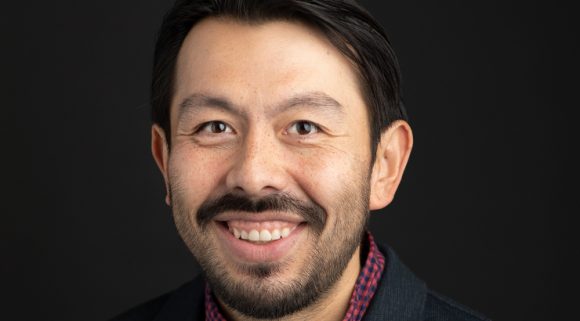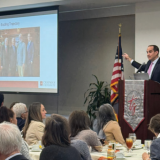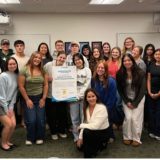
COVID-19 Impacts on Mental Health Explored at Chapman’s Ask the Experts Town Hall Andrew Kami, Ph.D., Chapman’s director of Student Psychological Counseling Services, participated in the recent Ask the Experts town hall with local mental health experts.
January 20, 2021
Among the health care challenges laid bare by the COVID-19 crisis is the need for more mental health services, especially for children and the elderly, according to panelists speaking at Chapman University’s recent Ask the Experts Virtual Town Hall – COVID-19 and Impacts on Mental Health.
The experts connected the pandemic to upticks in suicidal thinking and actions, depression, substance abuse and other stress-related behaviors, but added that a shortage of mental health providers and early intervention is exacerbating the challenge of offering care to those in need.
“Mental health concerns are not new. And mental health and substance abuse have been ongoing. These are problems that we have not been dealing with well as communities. The data is very clear. One in five people have a mental health problem in a given year and the ability to provide for that care for people who have that need is clearly insufficient,” said Dr. Richard Afable, president of the nonprofit organization MindOC/Be Well OC and a Chapman University trustee.
Virtual Town Halls Offer Expert Insight
Addressing COVID-19 and other timely topics has been the aim of Chapman’s Ask the Experts Town Hall series since it launched in March, bringing together knowledgeable faculty and community leaders from a variety of disciplines, viewpoints, and backgrounds to discuss subjects ranging from COVID-19 vaccine progress to the impact of lockdowns on the economy.
This most recent town hall dovetails with Chapman’s new health and wellness initiative, which includes an infrastructure of resources for the entire campus community, all curated on the university’s Health and Wellness website.
In fact, the one bright note in the experts’ discussion was that they see signs that many college students are faring somewhat better than other populations because colleges and universities have expanded social services and counseling in response to quarantine challenges. From food banks and mindfulness workshops, to more in-depth counseling, the services have a cumulative effect and are normalizing conversations about mental health, said Andrew Kami Ph. D., MFT, director of Student Psychological Counseling Services at Chapman.
Students Are Cared For
“You have a population of students, particularly here at Chapman, who are cared for,” said Kami, who has expanded access to counseling since his arrival on campus.. “We have people they can reach out to … in and out of the classroom. It’s translating into a space where a lot of our students are developing these resiliency factors that will help them successfully get through this.”
Among Chapman’s resources is the Frances Smith Center for Individual and Family Therapy, where advanced students in the MFT graduate program provide free COVID-19 response counseling under faculty supervision. Some of the most common issues clients need help with include social isolation, job loss and financial worries and home life problems exacerbated by quarantine, said Naveen Jonathan, Ph.D., associate professor and chair of marriage and family therapy program. In addition, he noted that research on COVID-19 impact on family and couples is still evolving.
“It’s important for us to keep in mind that there may be other affects that may take place,” Jonathan said.
Children could have an especially hard time, said Heather Huszti, Ph.D., a licensed psychologist and chief psychologist at CHOC children’s hospital. Her department has seen a 100% increase in requests for mental health services. Data from other disasters and traumas show that the affects can be long lasting or delayed in children, she said. Symptoms can include anxiety, acting out, depression, self-injury and suicidal thoughts and actions.
“Some people don’t have symptoms until well after the event,” Huszti said. “That’s something to think about.”
Learn More About Ask the Experts Town Halls
The entire discussion can be viewed online. To view the full schedule of events hosted by Chapman’s Office of Research, visit the Ask the Experts Virtual Town Hall page.

